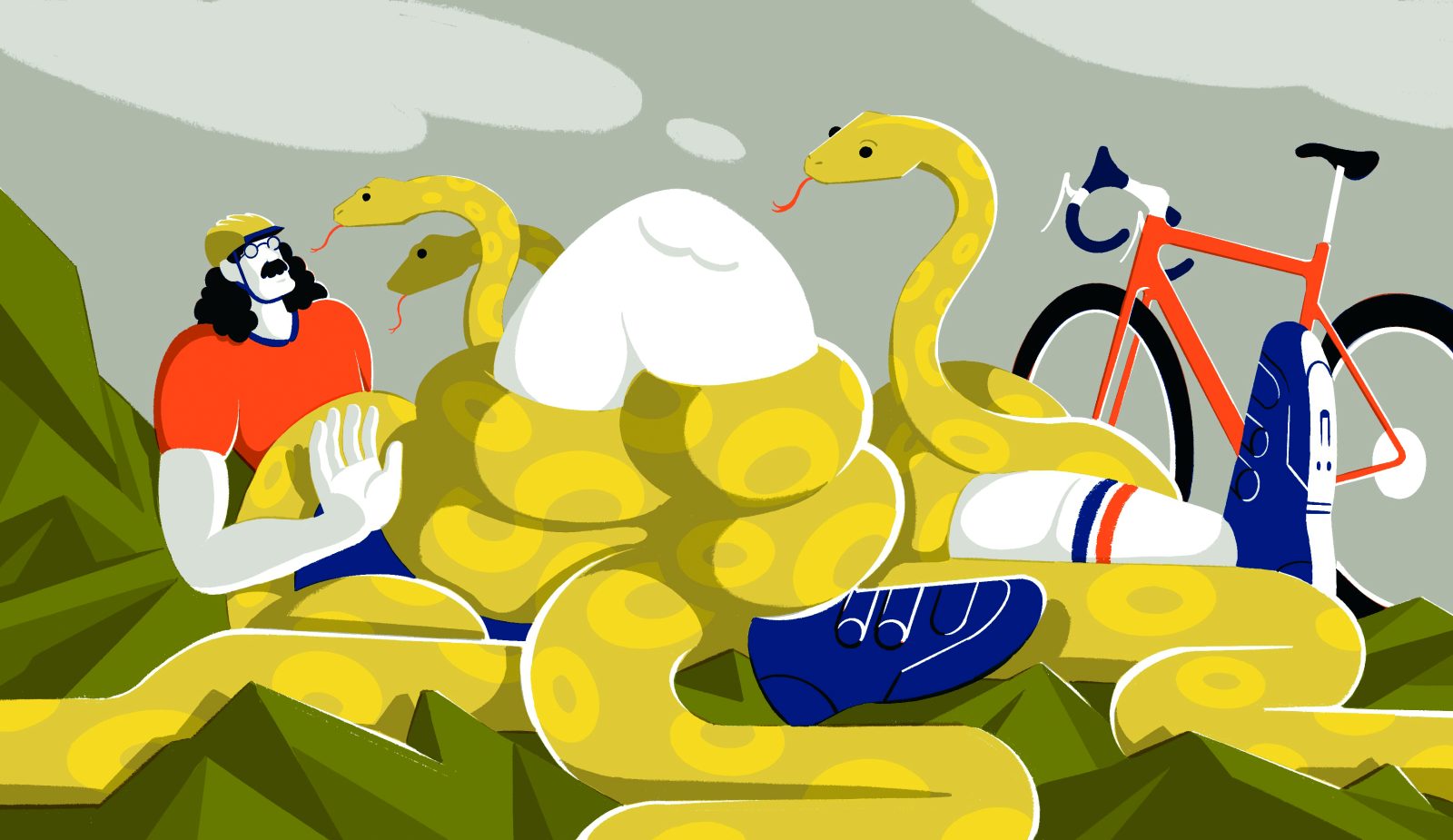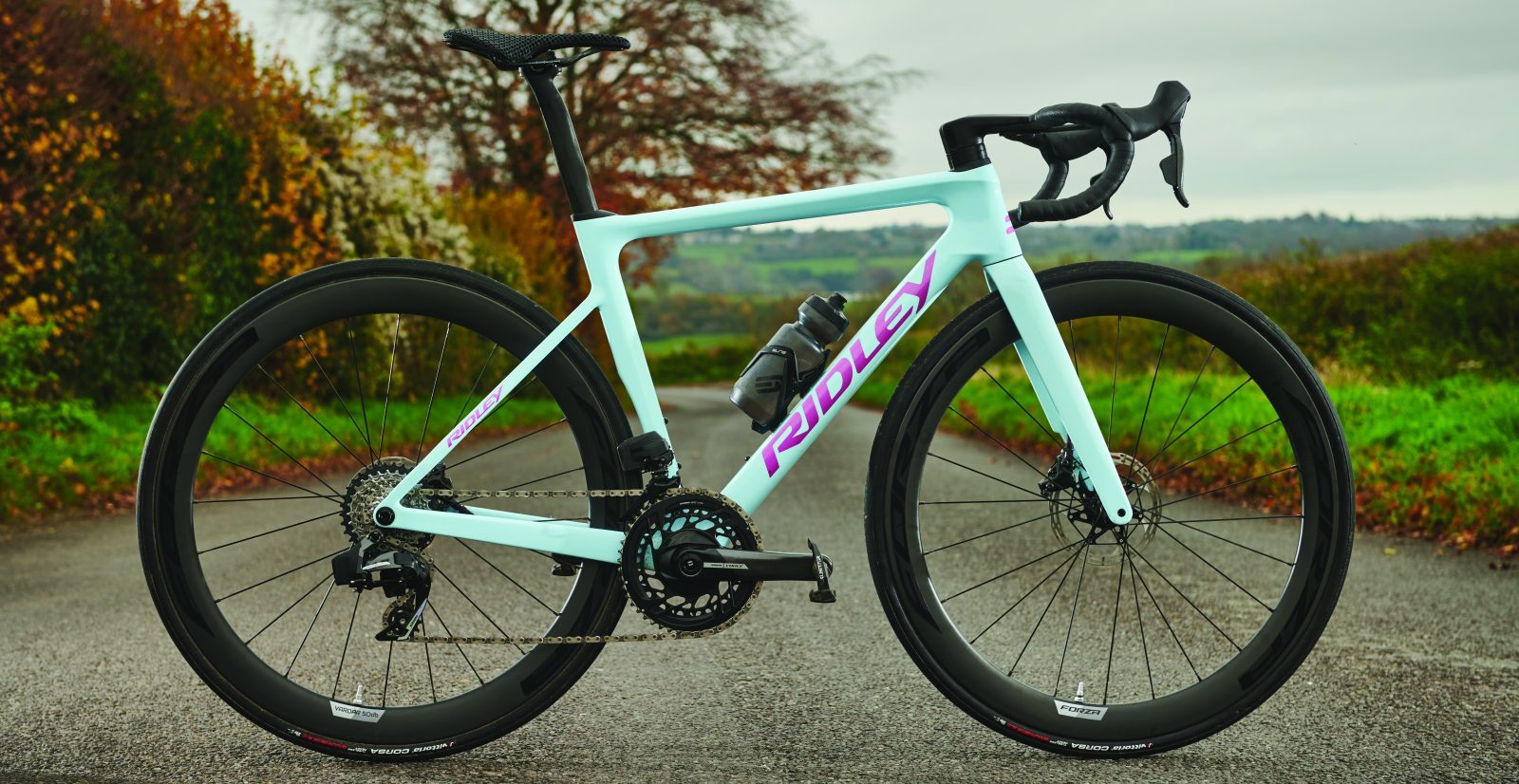It’s true that less weight equals more speed. But there are limits.
Words MICHAEL DONLEVY
Illustrations ROB MILTON
Look at Chris Froome. Look at him. His body seems like it’s made from drinking straws with an orange on top. But look how fast he rides uphill. Faster than most of us can achieve on the flat, so if only we could be as thin as Chris Froome, we too could ride like a Tour champion. Or could we?
‘Lighter is faster, that’s true, but only when there’s no decline in power output,’ says Greg Whyte, professor of applied sport and exercise science at England’s Liverpool John Moores University. ‘If losing weight means stripping power then any advantage is likely to be lost.’
Appropriately, given we’re talking about riding something that starts out with stabilisers, the key here is balance.
‘There are two aspects to finding the right balance,’ says Whyte. ‘Firstly, what’s the goal? Are you riding a timetrial on a flat course, or are you climbing a mountain? The flatter the course, the less important weight becomes.
‘Once you’ve established your goal you need to know where you’re at,’ he adds. ‘You can’t lose weight and then speculate what your power output was before you lost that weight. You need to use a power meter, because you need to measure power output on the bike. Once you’ve done this you can monitor changes over time.’
Muscle vs fat
‘When we talk about weight we’re talking about either muscle or body fat,’ says Paul Butler of PB Cycle Coaching, a coach who started exercising and cycling because he was overweight. ‘The ideal amount is enough to carry out the rider’s role – climbing, sprinting – and no more. Only you can find that point for you, but with specific training your muscles will adapt to the task at hand, so let’s assume you’re not carrying too much muscle.
‘Body fat is another story,’ he says. ‘The fear is not so much about becoming too thin aesthetically, it is: how low are your body fat levels? According to the American Council of Exercise, athletes tend to be between 14-20% body fat for females and 6-13% for males. They also recommend that to stay healthy you should never go below 10-13% for a woman and 2-5% for a man, so the ranges are actually pretty big.’
There are various ways of measuring body fat – skinfold tests, bioelectric impedance or air/water displacement, to name three – but rather than obsess about it, you may be better off simply gauging how you feel.
Health matters
‘Athletic performance is a balance of physical output and health, and stripping weight can cause health issues,’ says Whyte. ‘Women can suffer loss of menstrual function and are particularly susceptible to a fall in bone mineral density, although that can affect male endurance athletes too. Chronic calorie restriction can affect immune function. Extreme weight loss is counterproductive if you lose the training impulse.’
This is a very real danger among amateur cyclists, some of whom copy the pros without having a team of sports nutrionists behind them. Bradley Wiggins was quick to credit his weight loss for his rise in form at the Grand Tours, saying in 2009, ‘Compared to the 2007 Tour, my weight loss means I’m carrying the equivalent of six bags of sugar less up a mountain.’ But amateurs trying to copy him could end up making themselves ill or obsessing about food. According to a paper published in the Journal of the American Dietetic Association, 20% of male cyclists studied showed signs of abnormal eating behaviours, yet less than half of them grasped that the way they ate – or didn’t – could be called a disorder.
‘I think we do obsess more over weight and body image than in many other sports,’ says British Cycling coach Will Newton. ‘A lot of cyclists do almost have an eating disorder. The culture is that a lot of young guys are told they need to lose weight when actually they’re at the age when that’s the last thing they should be doing. They should be thinking about power, about having enough energy to improve and about being the best they can be.’
The right shape
So what about Froome? Is he actually too thin? ‘Many people comment on Froome’s arms but they never talk about his legs,’ says Whyte. ‘The simple fact is he is perfectly moulded for cycling.’
‘It’s our perception of Chris Froome that’s wrong, not Froome himself,’ Newton agrees. ‘His BMI isn’t unhealthy because he’s carrying so much muscle mass in his legs. He doesn’t have the leanest body in the world. He doesn’t have a massively cut six-pack. His arms and core are as strong as they need to be, but no more than that.’
In fact, Froome’s BMI is 20.7, which although at the lower end of the scale is considered healthy (below 20 is ‘underweight’). ‘It’s not just about losing weight all over – pros lose weight from specific areas of the body, and that sort of “spot reduction” is very difficult unless you spend all your time on the bike,’ Whyte says. ‘The problem is that many people believe there are shortcuts to performance. The simple fact is that it’s time in the saddle and working hard regularly that will lead to increased performance. Then you can start to think about marginal gains.’
‘Most of us are not in teams, and aren’t protected by other riders. We turn up and race,’ Newton adds. ‘So if you decide you want to be the lightest climber you can be, you’re still going to have to put the work in on the flat. You won’t have team-mates pulling you along, and if you’re in a 10-man breakaway and you don’t take your turn at the front you’re likely to be pushed into a ditch before you reach the climb. You’re better off trying to be the best all-round rider you can be, and that means doing the right training combined with good, everyday nutrition. Leave the climbing to the pro who’s 5ft 5in and gets blown over by a gust of wind.’
If you do still want to lose weight, slow and steady is the key. ‘If you provide your body with all the macro and micronutrients it requires to function and no more, the body uses up unnecessary body fat,’ says Butler. ‘This is what I’ve done for eight years and so far I’ve lost 48kg. Keep a training diary, weigh yourself weekly and you’ll notice if your performance drops away as you lose weight. If you lose no more than 1kg in a week it’s a myth that losing weight means you’ll sacrifice power as you’ll have the same oxygen going to fewer fat cells – meaning more oxygen goes to the muscles and can produce more power. You’ll also have less fat around your middle to inhibit your breathing.’
‘Think about why you started riding in the first place,’ says Newton. ‘It was probably to get fitter, lose some weight and do something cool. It wasn’t to obsess about weight or be neurotic about your performance, to the point where you go from slightly overweight to worryingly underweight. If you race, give it everything you have and enjoy it.’
So can you be too thin? ‘Absolutely, 100%,’ says Whyte. ‘And that will result in a loss of performance and health.’
Beer?
With all that said, you deserve a well-earned beer. But will this undo all the good?


